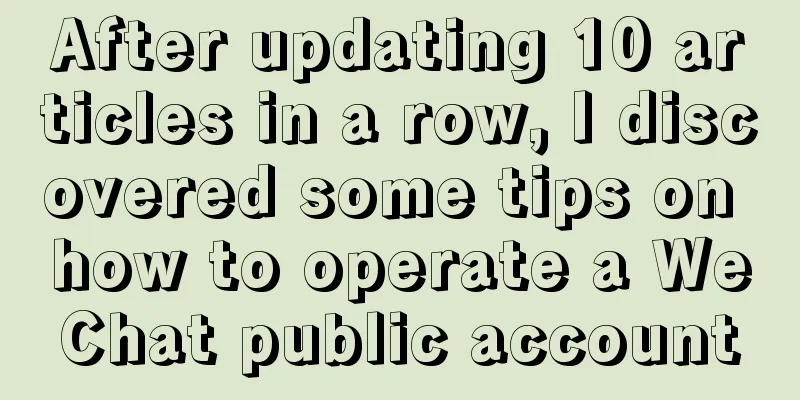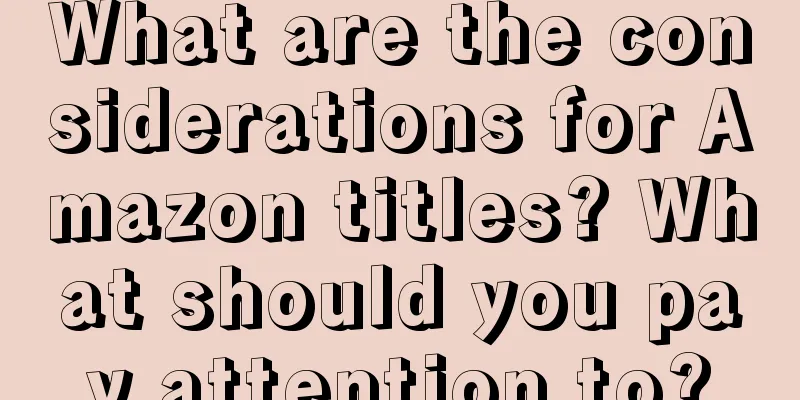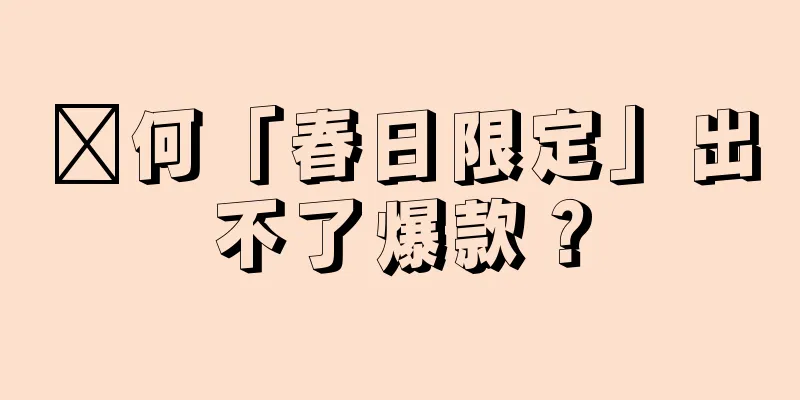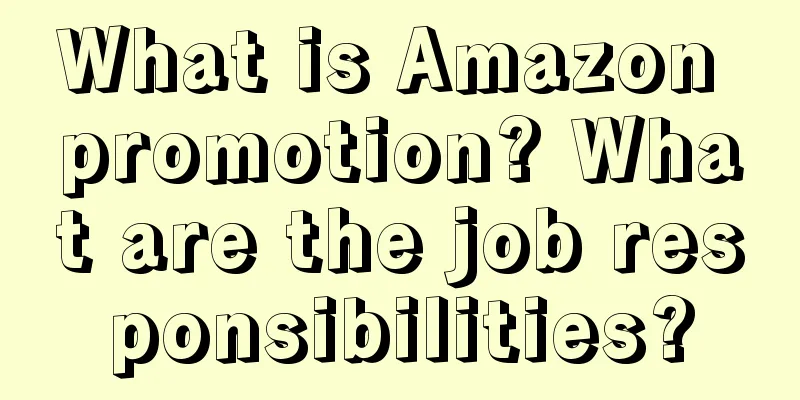After updating 10 articles in a row, I discovered some tips on how to operate a WeChat public account

Ever since I discovered that the traffic of WeChat public accounts has returned, I have rekindled my passion for creation. I have recently updated 10 articles in a row. I have changed from an author who updates once a month to an author who updates every other day. As for why I have not been able to update every day, it is mainly because I want to create some quality content as much as possible. When it comes to writing articles, once you output them crazily, they can easily become "parallel imports". I don't think it's necessary to write just for the sake of writing, or to update just for the sake of updating. The quality of the content must also be guaranteed. I found that since I wrote two articles related to WeChat official accounts, many people have added me on WeChat to discuss the operation and creation of WeChat official accounts. In fact, I am also observing while writing in this regard. I have the role of both a content creator and an observer of the Internet industry. In addition, my nearly 10 years of operation experience in the self-media industry may provide others with a different perspective. After updating 10 articles in a row recently, I discovered some operating skills for WeChat public accounts: 1. Best time to publishMany WeChat public account operators are creators. This role makes them think that as long as they write good content, it will be fine. But in fact, readers do not think so. In other words, people who write articles should consider the readers' reading time period. According to observations, the best time to publish on WeChat public accounts is: 8:00-9:00 a.m., 12:00 noon-1:00 p.m., and 5:00 p.m.-11:00 p.m. In general, if it is not a sudden hot topic, it is best to publish between 5:00 p.m. and 11:00 p.m. Of course, this does not mean that content cannot be published during other time periods, but from the perspective of maximizing traffic, the traffic of the day may be higher between 5pm to 11pm. Under normal circumstances, the traffic of an article will last for 48 hours, and will seriously decline on the third day. If the article itself is a hot topic, there may be a sporadic increase in the number of readings per day. In the first 48 hours, the reading volume is at its peak. If it does not become popular during this period, then the traffic of this article is likely to be just like that. For some long-tail articles, the relevant traffic will last for a month or even longer. Here’s another tip: articles from WeChat public accounts are more effective when shared on Moments after 9 p.m. 2. What does reading volume relate to?The main recommendation mechanism of personalized recommendation platforms such as Toutiao and Xiaohongshu is pre-push. For example, the system will first push your article to 1,000 people through tags and user portraits, and look at the browsing time, likes, shares, comments and other data of these 1,000 people. If the data is very good, the system may further push it to more people, and the next time it may be 10,000 people, and then it will be pushed to a larger traffic pool. If the data in the first stage is not good, this article will basically not be recommended again. The data I observed from Xiaohongshu is that when you just post a content, the background traffic display is generally 23 or 26. After a period of time, if the data does not increase exponentially, then this content is most likely not a hit. What makes WeChat public accounts different from Toutiao and Xiaohongshu is that they have social attributes. Therefore, various data tags of users on social media will be more valued by the system. For example, click-through rate, comments, likes, reading, number of shares, and underlines are directly related to the number of article readings. If you find that the data of the articles you posted on your WeChat official account are not good, you can look at the five data: comments, likes, reading, number of shares, and cross-links. It has been observed that the WeChat public platform gives very high weight to messages. After the message sender posts a comment, if the author sets it as "selected" in the background, the message sender will receive a notification in WeChat saying "Congratulations, your message has been selected as a selected message". Similarly, if any author replies, the system will also notify. The importance that WeChat public accounts attach to "messages" is also reflected in the fact that when other users like your message, the system will send you a notification again, "In the past day, your message received XXX likes." I have observed an article written by a self-media person with 210,000 views. This article only received 35 comments, which is not a high number. However, the comment with the highest number of likes reached 206 times, and the second one received 96 likes. When writing, public account operators can also consider the incentives for leaving messages, that is, how to get more users to participate in leaving messages. In addition to being related to user-side data, the number of readings is also closely related to the title. The title is a critical point in determining whether an article can become popular. The title means whether it will attract more users to click. If it does not have the function of attracting user clicks, subsequent traffic will naturally not keep up. Of course, I have also seen some WeChat public accounts that win purely by content. They don’t call for titles at all. They just write random titles, but the final traffic is not bad. I guess this is related to their fan base and fan stickiness. If the fan base is large and sticky, the traffic obtained by writing any content will not be bad. But if you don’t have so many loyal fans, you may have to work hard on the title. 3. How to determine if you are kicked out of the traffic pool by the systemI first heard the term "kick out of the traffic pool" (actually, it means limiting traffic) in the first article I wrote about WeChat official accounts. It seems that another user mentioned it in the second article. I have not encountered this situation myself, but I guess the so-called "kick out of the traffic pool" may be related to cheating determined by the system, such as clickbait, false content, plagiarism, etc. How can the operators of official accounts determine whether they have been kicked out of the traffic pool? I think you can refresh your reading volume data on the subscription account assistant. If the title is fine, but the reading volume has hardly changed, it means that this article has not been recommended. If there is a limit on traffic, the system will not have any notification, and you can only check it yourself. Generally, when encountering this situation, you can try to register a new account again, or continue to update until the traffic returns. 4. TitleI have seen several articles on WeChat public accounts with a small number of followers that have traffic of over 10,000. The titles are very distinctive, and there are even cases where the third article has far more readers than the first. Here are some common methods of taking titles: First, keywords. Try to include key keywords. Second, there is a sense of contrast. Third, question mark-style titles, such as why..., XXX? Fourth, exclamation mark title. (I personally don’t like to use this, but the effect seems to be good) Fifth, there are emotional points at first glance. Sixth, think from the bottom up, not from the top down. Regardless of whether your article is a serious one or not, if you want high traffic, you can change the title appropriately. When choosing a title, be careful not to be too clickbait. You should know that the system does not welcome super exaggerated clickbait titles, and its judgment on clickbait titles will continue to upgrade. If you still use the old clickbait titles, you will most likely be punished instead of entering the traffic pool. 5. Content Quality and Content AttributesEven though they all have 100,000+ views, the share prices of various public accounts are completely different. Therefore, although some accounts can also produce 100,000+ views, their unit prices are lower. Based on my experience in operating Toutiao accounts, this is related to the attributes of the account. If the content of an account is disorganized, sometimes entertainment content, sometimes automotive content, and sometimes emotional content, the share of 100,000+ views of this account will be relatively low. However, if the account itself is a vertical account, then the share of 100,000+ views will be several times that of ordinary accounts. In terms of content quality, the traffic of original content will be higher than that of non-original content, and the same is true for traffic share. Therefore, if you want to get higher returns, it is best to be original. Recently, I saw screenshots of WeChat public accounts with daily revenue of more than 5,000 yuan and more than 8,000 yuan shared by friends. I was really shocked. At present, the revenue of WeChat public accounts is the highest among all content platforms. Other platforms are not lacking in authors, but they continue to suppress authors and the traffic share is getting lower and lower. They are not as good as WeChat public accounts. I wonder how much your revenue is? |
Recommend
To achieve recognition, to break out of the circle, and to productize, this is my half-year entrepreneurial review and experience summary
This article is based on personal work experience ...
Lin Daiyu rectifies workplace copywriting, old yin and yang
This article shares RIO Tipsy's "I'm ...
Recyclable jewelry live broadcasts are madly harvesting the elderly: crying while broadcasting, dozens of yuan of bracelets claim to be recycled for millions of yuan, and the anchor has more than 10 billion yuan in change
Recently, there are many people who are obsessed w...
Carrot Run "Information Explosion"
Baidu's Carousel has recently become a frequen...
With the European Cup approaching, can Chinese overseas brands still reap the benefits?
Chinese brands are gradually going abroad and work...
Where can I view my earnings on Amazon? How do I calculate my earnings?
When we operate an Amazon store, we need to know t...
What do you think about the "common prosperity" that Bilibili is about to give to UP masters?
B station’s incentive plan has been adjusted. This...
What does Amazon’s entry fee include? Introduction to Amazon’s entry fee
Amazon's cross-border e-commerce platform can ...
8,200 words of practical experience in operating Xiaohongshu, no marketing but only practical stuff!
As a rare traffic depression, Xiaohongshu still ha...
Can Meituan Live break the ceiling of local life?
Can the launch of live streaming on the Meituan AP...
Selling milk tea at a stall and earning 50,000 yuan a month? I found 6 good products at the popular night market across the country
"Staying on the street" is popular. Many...
New opportunities in competition: How can the content industry break through in 2024?
Looking back at 2023, the new media industry has p...
Send Meituan a bullet
On February 11, JD.com announced the launch of a &...
Touching the soft hearts of new social animals, a collection of May Fourth creative and fresh works
Introduction: May 4th Youth Day has ended, and the...
If you copy the benchmark account well, you will make money.
When it comes to learning from benchmarking accoun...









